Knowledge Management and International Business Report
VerifiedAdded on 2023/03/30
|12
|2426
|338
Report
AI Summary
This report delves into the critical aspects of knowledge management, particularly within the context of multinational corporations (MNCs) and international knowledge transfer. It examines the significance of knowledge sharing and trust, highlighting their role in fostering competitiveness and achieving organizational goals. The report analyzes the case study "Knowledge translation through expatriates in international knowledge transfer," emphasizing the socio-cultural process involved in transferring knowledge between MNC headquarters and foreign subsidiaries. It reviews relevant literature, discusses the importance of expatriates in facilitating this process, and explores the role of trust as a key factor. The report also provides an overview of Knowledge Management Systems (KMS), discusses the critical components of KMS and document management systems (DMS), and references the SECI model. The conclusion confirms the vital role of expatriates as moderators in knowledge sharing, emphasizing the complexities of knowledge transfer and the importance of trust between management and subsidiaries within the KMS framework.
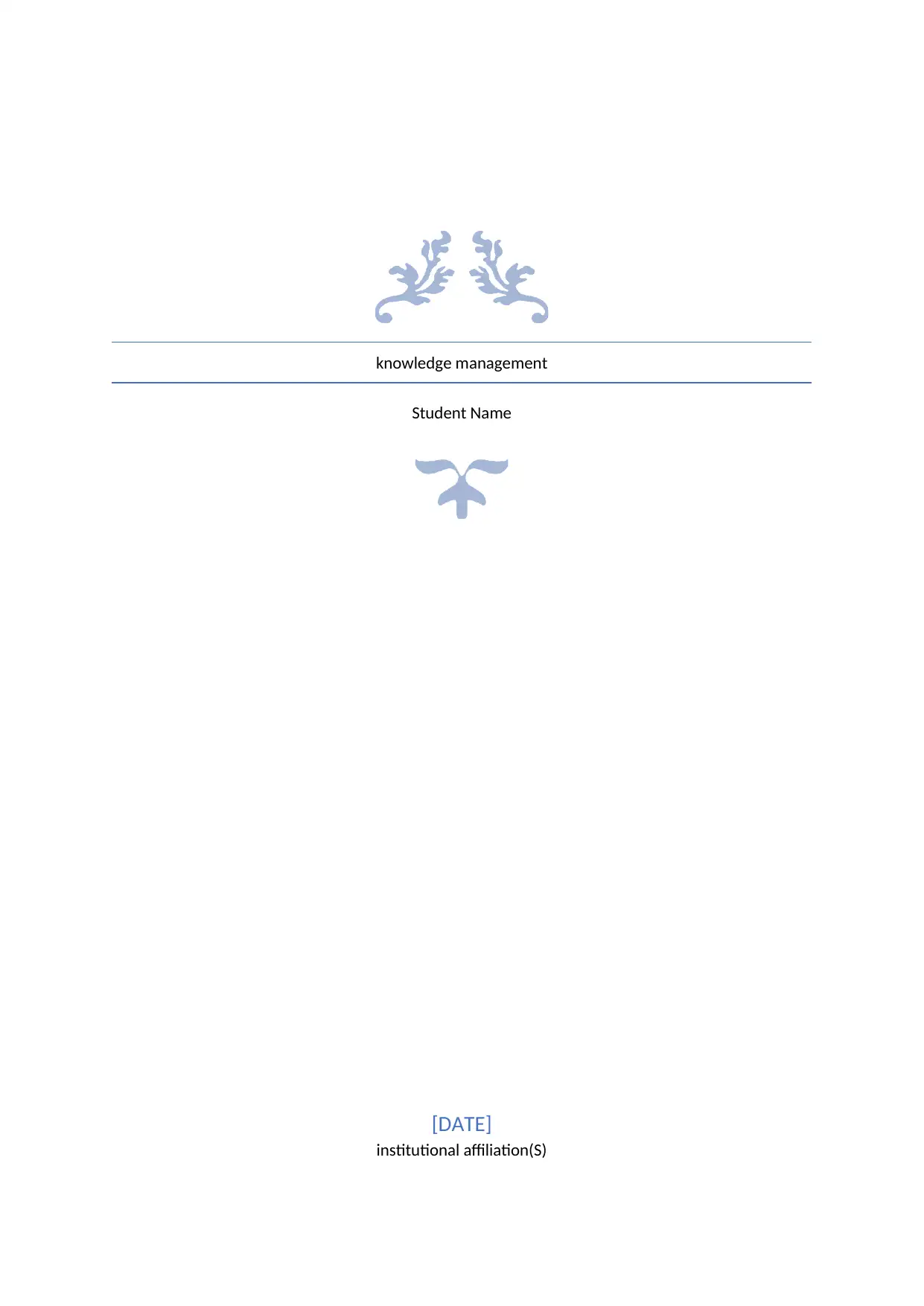
knowledge management
Student Name
[DATE]
institutional affiliation(S)
Student Name
[DATE]
institutional affiliation(S)
Paraphrase This Document
Need a fresh take? Get an instant paraphrase of this document with our AI Paraphraser
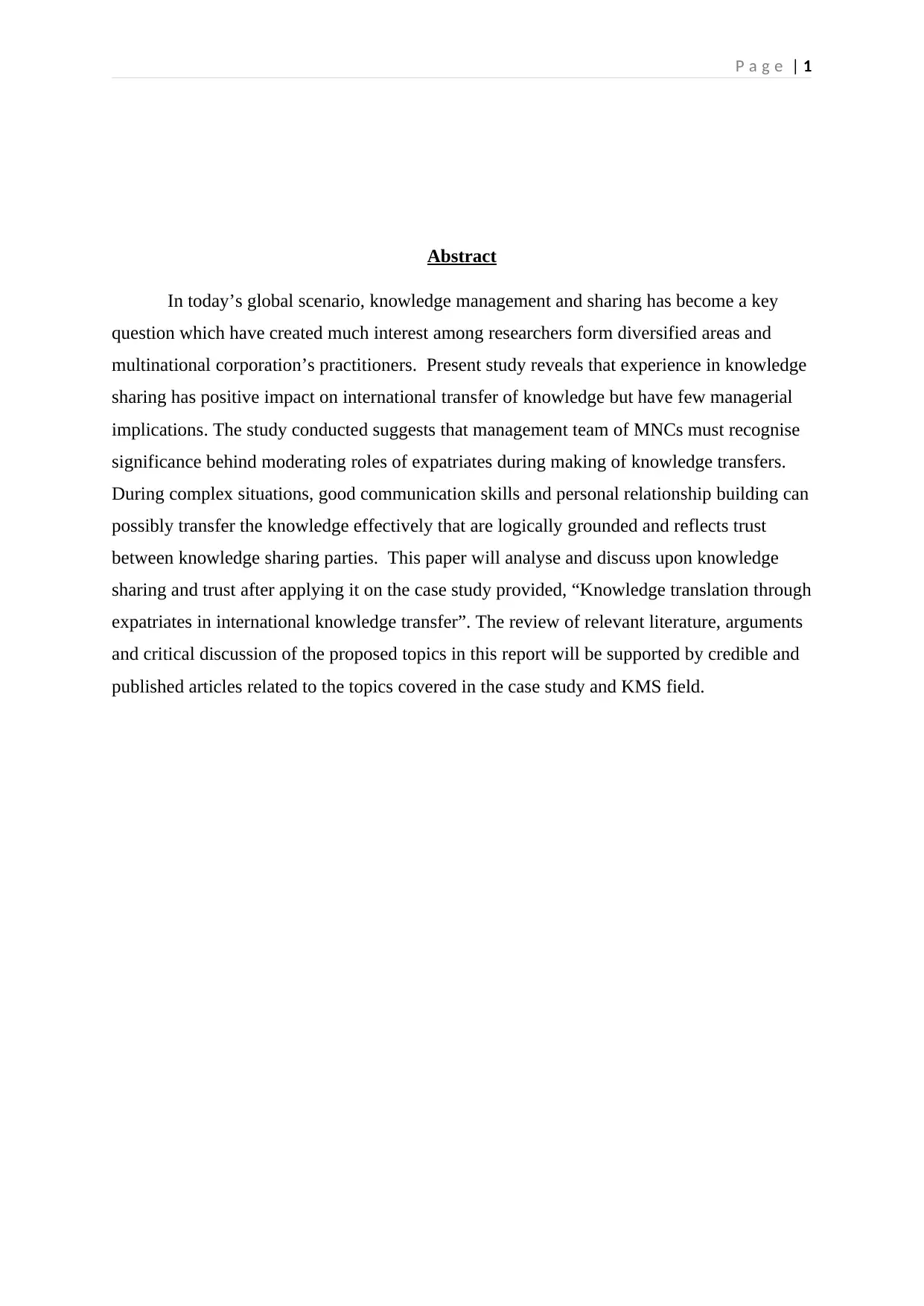
P a g e | 1
Abstract
In today’s global scenario, knowledge management and sharing has become a key
question which have created much interest among researchers form diversified areas and
multinational corporation’s practitioners. Present study reveals that experience in knowledge
sharing has positive impact on international transfer of knowledge but have few managerial
implications. The study conducted suggests that management team of MNCs must recognise
significance behind moderating roles of expatriates during making of knowledge transfers.
During complex situations, good communication skills and personal relationship building can
possibly transfer the knowledge effectively that are logically grounded and reflects trust
between knowledge sharing parties. This paper will analyse and discuss upon knowledge
sharing and trust after applying it on the case study provided, “Knowledge translation through
expatriates in international knowledge transfer”. The review of relevant literature, arguments
and critical discussion of the proposed topics in this report will be supported by credible and
published articles related to the topics covered in the case study and KMS field.
Abstract
In today’s global scenario, knowledge management and sharing has become a key
question which have created much interest among researchers form diversified areas and
multinational corporation’s practitioners. Present study reveals that experience in knowledge
sharing has positive impact on international transfer of knowledge but have few managerial
implications. The study conducted suggests that management team of MNCs must recognise
significance behind moderating roles of expatriates during making of knowledge transfers.
During complex situations, good communication skills and personal relationship building can
possibly transfer the knowledge effectively that are logically grounded and reflects trust
between knowledge sharing parties. This paper will analyse and discuss upon knowledge
sharing and trust after applying it on the case study provided, “Knowledge translation through
expatriates in international knowledge transfer”. The review of relevant literature, arguments
and critical discussion of the proposed topics in this report will be supported by credible and
published articles related to the topics covered in the case study and KMS field.
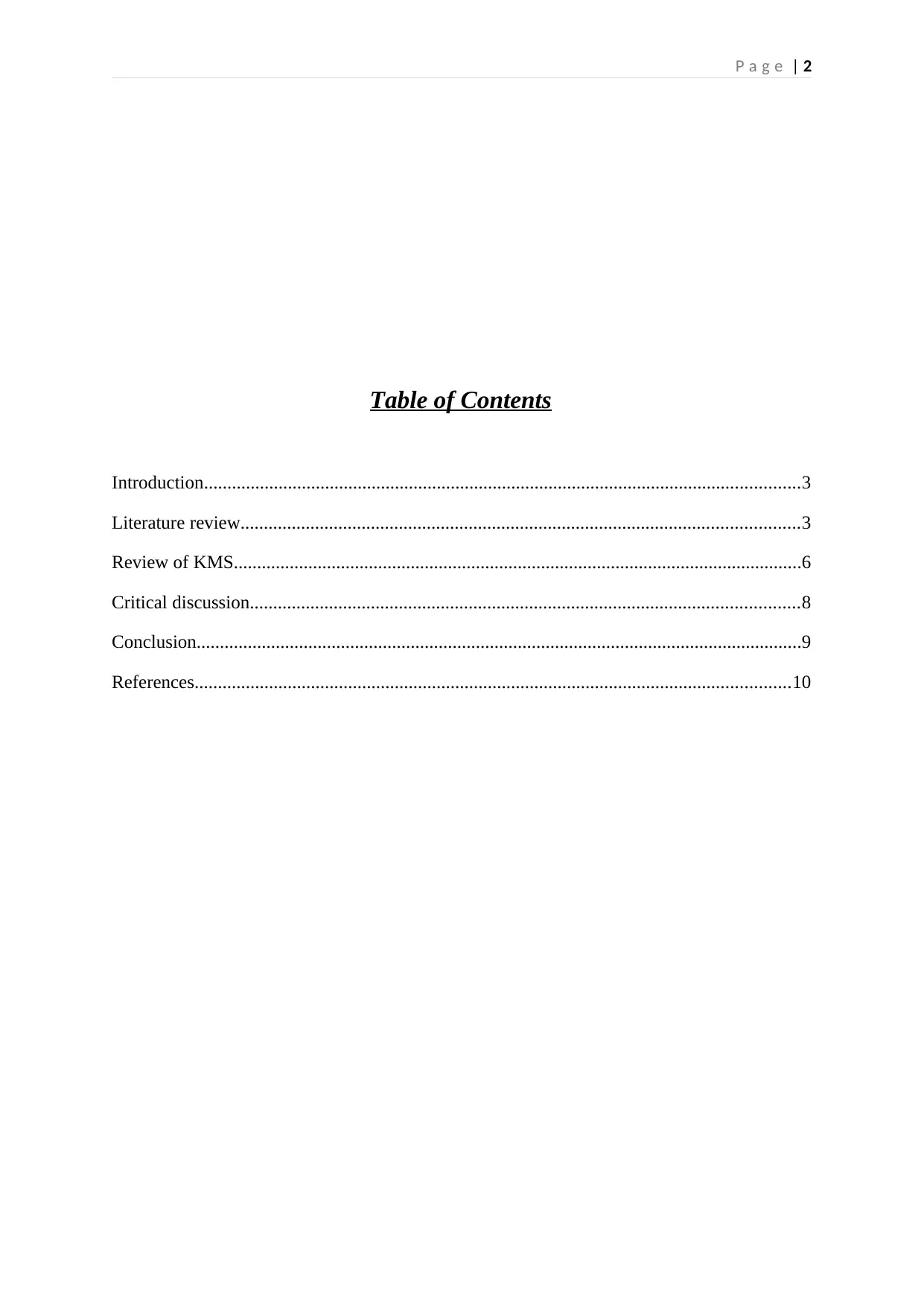
P a g e | 2
Table of Contents
Introduction................................................................................................................................3
Literature review........................................................................................................................3
Review of KMS..........................................................................................................................6
Critical discussion......................................................................................................................8
Conclusion..................................................................................................................................9
References................................................................................................................................10
Table of Contents
Introduction................................................................................................................................3
Literature review........................................................................................................................3
Review of KMS..........................................................................................................................6
Critical discussion......................................................................................................................8
Conclusion..................................................................................................................................9
References................................................................................................................................10
⊘ This is a preview!⊘
Do you want full access?
Subscribe today to unlock all pages.

Trusted by 1+ million students worldwide
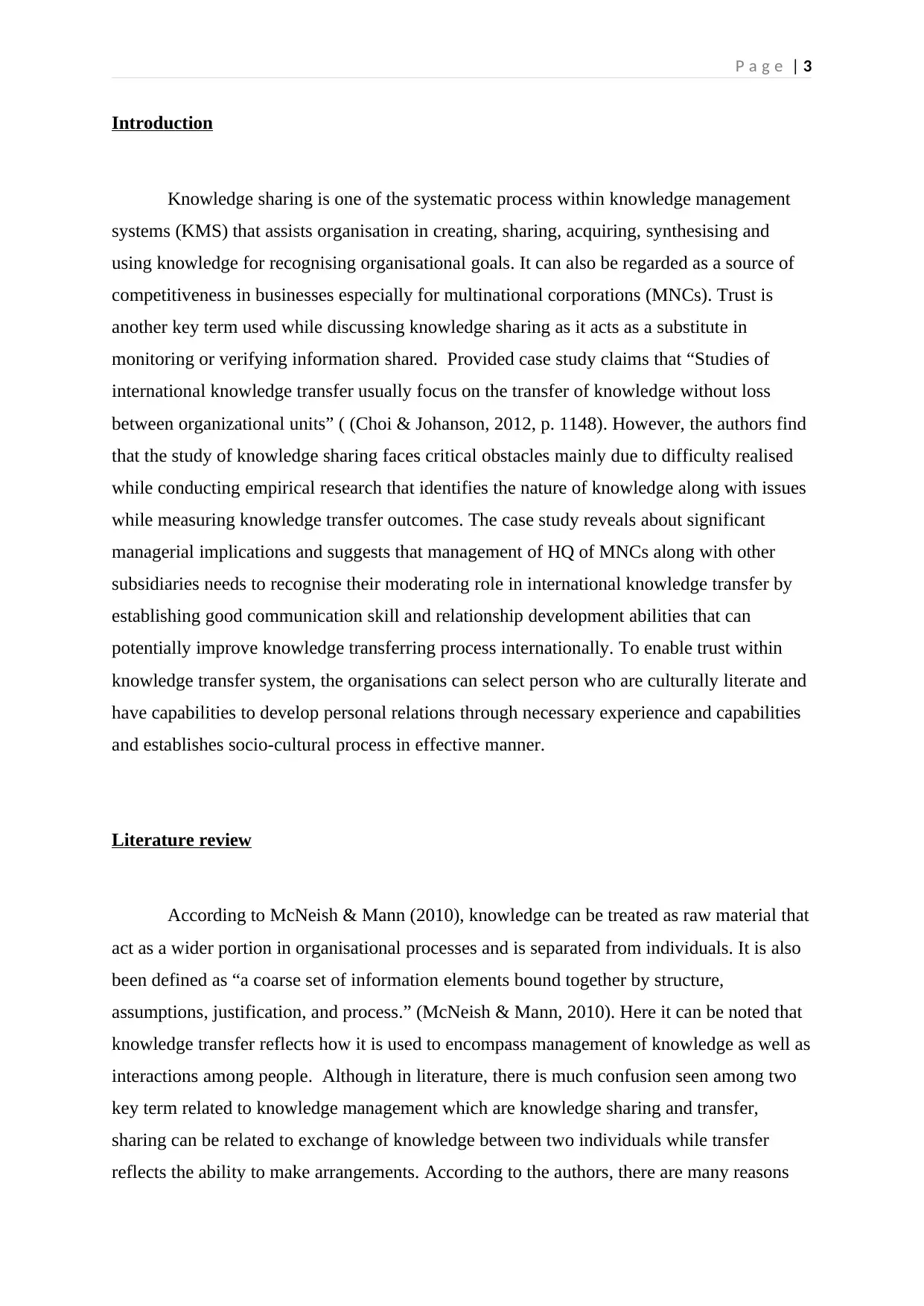
P a g e | 3
Introduction
Knowledge sharing is one of the systematic process within knowledge management
systems (KMS) that assists organisation in creating, sharing, acquiring, synthesising and
using knowledge for recognising organisational goals. It can also be regarded as a source of
competitiveness in businesses especially for multinational corporations (MNCs). Trust is
another key term used while discussing knowledge sharing as it acts as a substitute in
monitoring or verifying information shared. Provided case study claims that “Studies of
international knowledge transfer usually focus on the transfer of knowledge without loss
between organizational units” ( (Choi & Johanson, 2012, p. 1148). However, the authors find
that the study of knowledge sharing faces critical obstacles mainly due to difficulty realised
while conducting empirical research that identifies the nature of knowledge along with issues
while measuring knowledge transfer outcomes. The case study reveals about significant
managerial implications and suggests that management of HQ of MNCs along with other
subsidiaries needs to recognise their moderating role in international knowledge transfer by
establishing good communication skill and relationship development abilities that can
potentially improve knowledge transferring process internationally. To enable trust within
knowledge transfer system, the organisations can select person who are culturally literate and
have capabilities to develop personal relations through necessary experience and capabilities
and establishes socio-cultural process in effective manner.
Literature review
According to McNeish & Mann (2010), knowledge can be treated as raw material that
act as a wider portion in organisational processes and is separated from individuals. It is also
been defined as “a coarse set of information elements bound together by structure,
assumptions, justification, and process.” (McNeish & Mann, 2010). Here it can be noted that
knowledge transfer reflects how it is used to encompass management of knowledge as well as
interactions among people. Although in literature, there is much confusion seen among two
key term related to knowledge management which are knowledge sharing and transfer,
sharing can be related to exchange of knowledge between two individuals while transfer
reflects the ability to make arrangements. According to the authors, there are many reasons
Introduction
Knowledge sharing is one of the systematic process within knowledge management
systems (KMS) that assists organisation in creating, sharing, acquiring, synthesising and
using knowledge for recognising organisational goals. It can also be regarded as a source of
competitiveness in businesses especially for multinational corporations (MNCs). Trust is
another key term used while discussing knowledge sharing as it acts as a substitute in
monitoring or verifying information shared. Provided case study claims that “Studies of
international knowledge transfer usually focus on the transfer of knowledge without loss
between organizational units” ( (Choi & Johanson, 2012, p. 1148). However, the authors find
that the study of knowledge sharing faces critical obstacles mainly due to difficulty realised
while conducting empirical research that identifies the nature of knowledge along with issues
while measuring knowledge transfer outcomes. The case study reveals about significant
managerial implications and suggests that management of HQ of MNCs along with other
subsidiaries needs to recognise their moderating role in international knowledge transfer by
establishing good communication skill and relationship development abilities that can
potentially improve knowledge transferring process internationally. To enable trust within
knowledge transfer system, the organisations can select person who are culturally literate and
have capabilities to develop personal relations through necessary experience and capabilities
and establishes socio-cultural process in effective manner.
Literature review
According to McNeish & Mann (2010), knowledge can be treated as raw material that
act as a wider portion in organisational processes and is separated from individuals. It is also
been defined as “a coarse set of information elements bound together by structure,
assumptions, justification, and process.” (McNeish & Mann, 2010). Here it can be noted that
knowledge transfer reflects how it is used to encompass management of knowledge as well as
interactions among people. Although in literature, there is much confusion seen among two
key term related to knowledge management which are knowledge sharing and transfer,
sharing can be related to exchange of knowledge between two individuals while transfer
reflects the ability to make arrangements. According to the authors, there are many reasons
Paraphrase This Document
Need a fresh take? Get an instant paraphrase of this document with our AI Paraphraser
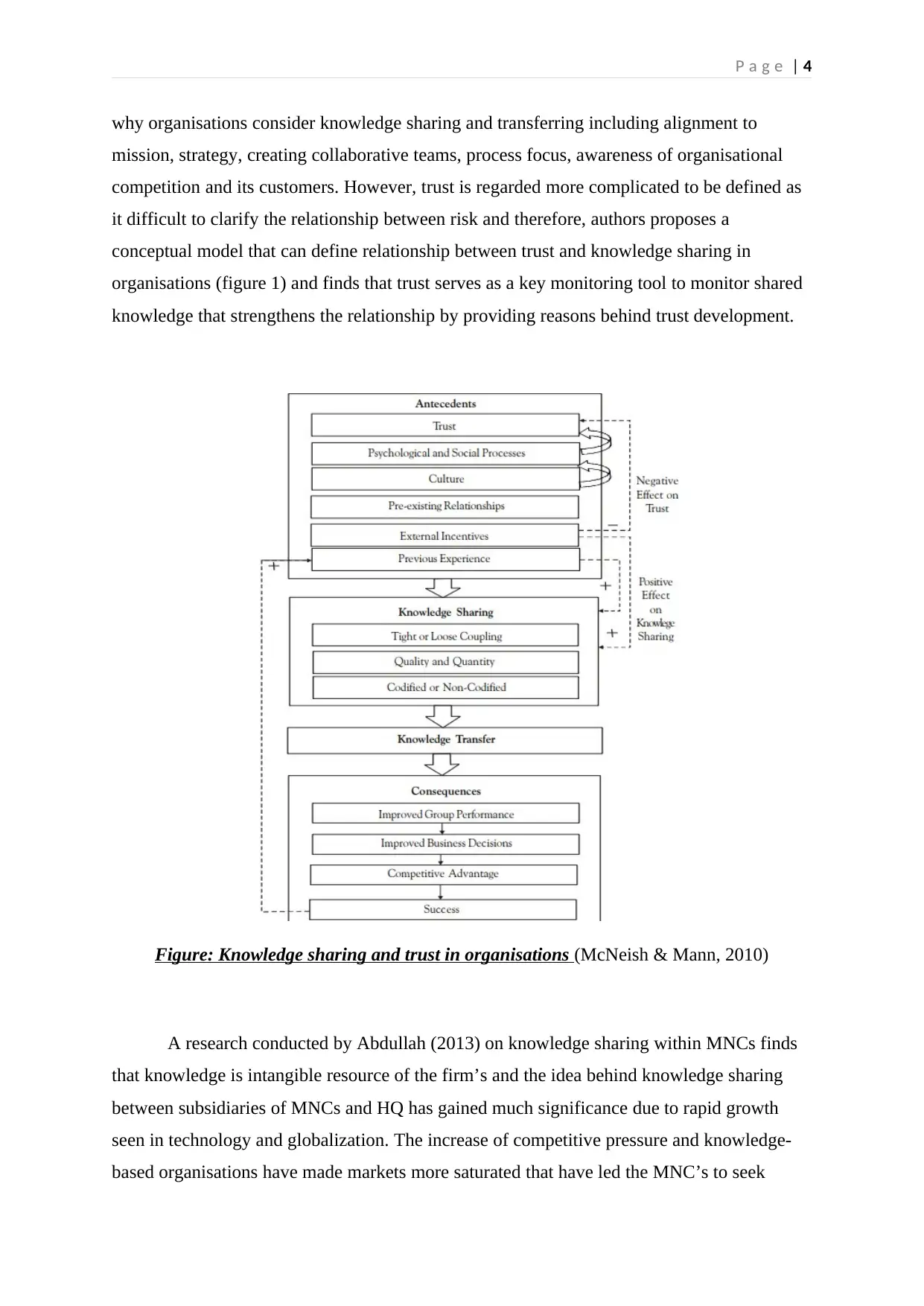
P a g e | 4
why organisations consider knowledge sharing and transferring including alignment to
mission, strategy, creating collaborative teams, process focus, awareness of organisational
competition and its customers. However, trust is regarded more complicated to be defined as
it difficult to clarify the relationship between risk and therefore, authors proposes a
conceptual model that can define relationship between trust and knowledge sharing in
organisations (figure 1) and finds that trust serves as a key monitoring tool to monitor shared
knowledge that strengthens the relationship by providing reasons behind trust development.
Figure: Knowledge sharing and trust in organisations (McNeish & Mann, 2010)
A research conducted by Abdullah (2013) on knowledge sharing within MNCs finds
that knowledge is intangible resource of the firm’s and the idea behind knowledge sharing
between subsidiaries of MNCs and HQ has gained much significance due to rapid growth
seen in technology and globalization. The increase of competitive pressure and knowledge-
based organisations have made markets more saturated that have led the MNC’s to seek
why organisations consider knowledge sharing and transferring including alignment to
mission, strategy, creating collaborative teams, process focus, awareness of organisational
competition and its customers. However, trust is regarded more complicated to be defined as
it difficult to clarify the relationship between risk and therefore, authors proposes a
conceptual model that can define relationship between trust and knowledge sharing in
organisations (figure 1) and finds that trust serves as a key monitoring tool to monitor shared
knowledge that strengthens the relationship by providing reasons behind trust development.
Figure: Knowledge sharing and trust in organisations (McNeish & Mann, 2010)
A research conducted by Abdullah (2013) on knowledge sharing within MNCs finds
that knowledge is intangible resource of the firm’s and the idea behind knowledge sharing
between subsidiaries of MNCs and HQ has gained much significance due to rapid growth
seen in technology and globalization. The increase of competitive pressure and knowledge-
based organisations have made markets more saturated that have led the MNC’s to seek
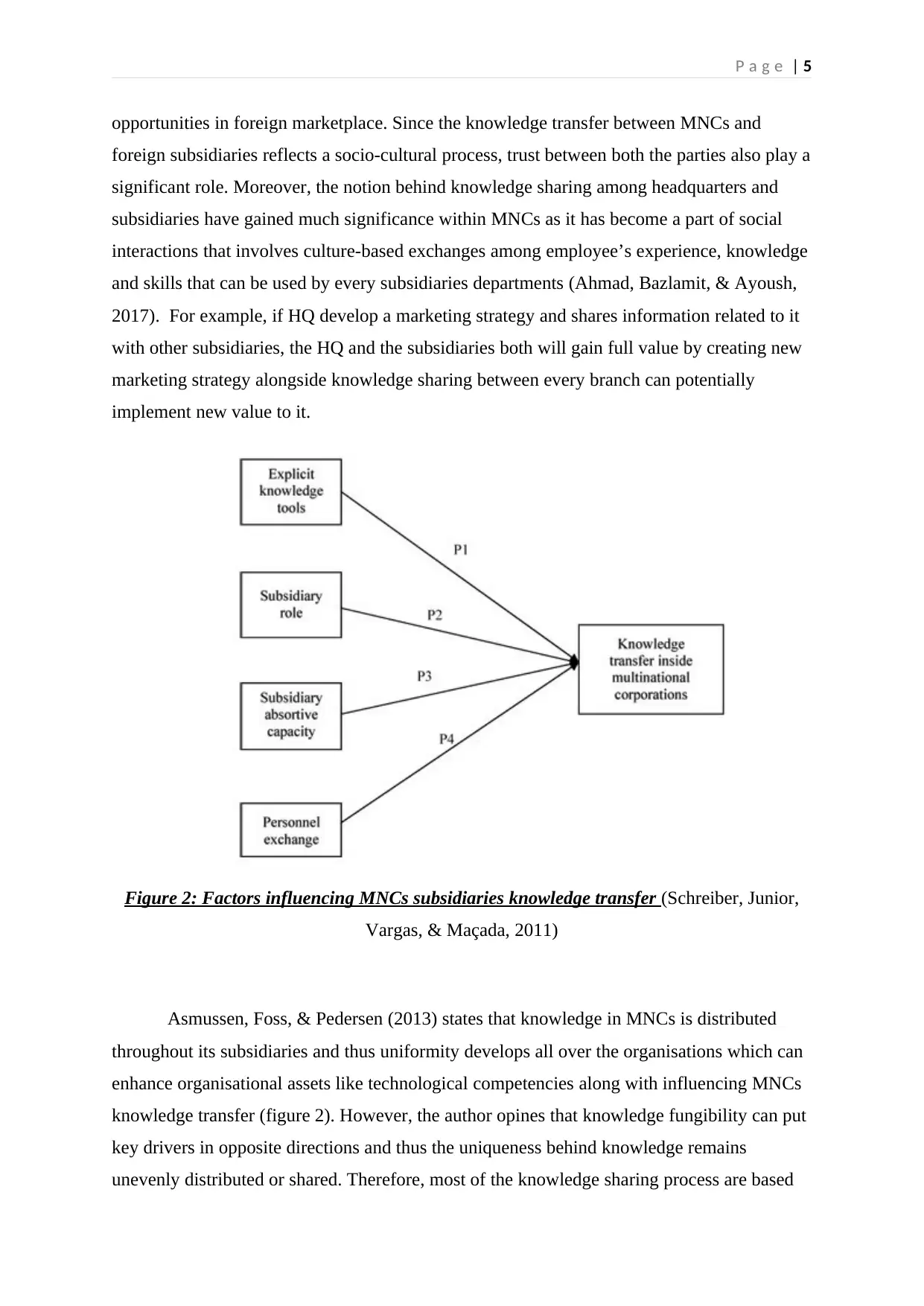
P a g e | 5
opportunities in foreign marketplace. Since the knowledge transfer between MNCs and
foreign subsidiaries reflects a socio-cultural process, trust between both the parties also play a
significant role. Moreover, the notion behind knowledge sharing among headquarters and
subsidiaries have gained much significance within MNCs as it has become a part of social
interactions that involves culture-based exchanges among employee’s experience, knowledge
and skills that can be used by every subsidiaries departments (Ahmad, Bazlamit, & Ayoush,
2017). For example, if HQ develop a marketing strategy and shares information related to it
with other subsidiaries, the HQ and the subsidiaries both will gain full value by creating new
marketing strategy alongside knowledge sharing between every branch can potentially
implement new value to it.
Figure 2: Factors influencing MNCs subsidiaries knowledge transfer (Schreiber, Junior,
Vargas, & Maçada, 2011)
Asmussen, Foss, & Pedersen (2013) states that knowledge in MNCs is distributed
throughout its subsidiaries and thus uniformity develops all over the organisations which can
enhance organisational assets like technological competencies along with influencing MNCs
knowledge transfer (figure 2). However, the author opines that knowledge fungibility can put
key drivers in opposite directions and thus the uniqueness behind knowledge remains
unevenly distributed or shared. Therefore, most of the knowledge sharing process are based
opportunities in foreign marketplace. Since the knowledge transfer between MNCs and
foreign subsidiaries reflects a socio-cultural process, trust between both the parties also play a
significant role. Moreover, the notion behind knowledge sharing among headquarters and
subsidiaries have gained much significance within MNCs as it has become a part of social
interactions that involves culture-based exchanges among employee’s experience, knowledge
and skills that can be used by every subsidiaries departments (Ahmad, Bazlamit, & Ayoush,
2017). For example, if HQ develop a marketing strategy and shares information related to it
with other subsidiaries, the HQ and the subsidiaries both will gain full value by creating new
marketing strategy alongside knowledge sharing between every branch can potentially
implement new value to it.
Figure 2: Factors influencing MNCs subsidiaries knowledge transfer (Schreiber, Junior,
Vargas, & Maçada, 2011)
Asmussen, Foss, & Pedersen (2013) states that knowledge in MNCs is distributed
throughout its subsidiaries and thus uniformity develops all over the organisations which can
enhance organisational assets like technological competencies along with influencing MNCs
knowledge transfer (figure 2). However, the author opines that knowledge fungibility can put
key drivers in opposite directions and thus the uniqueness behind knowledge remains
unevenly distributed or shared. Therefore, most of the knowledge sharing process are based
⊘ This is a preview!⊘
Do you want full access?
Subscribe today to unlock all pages.

Trusted by 1+ million students worldwide
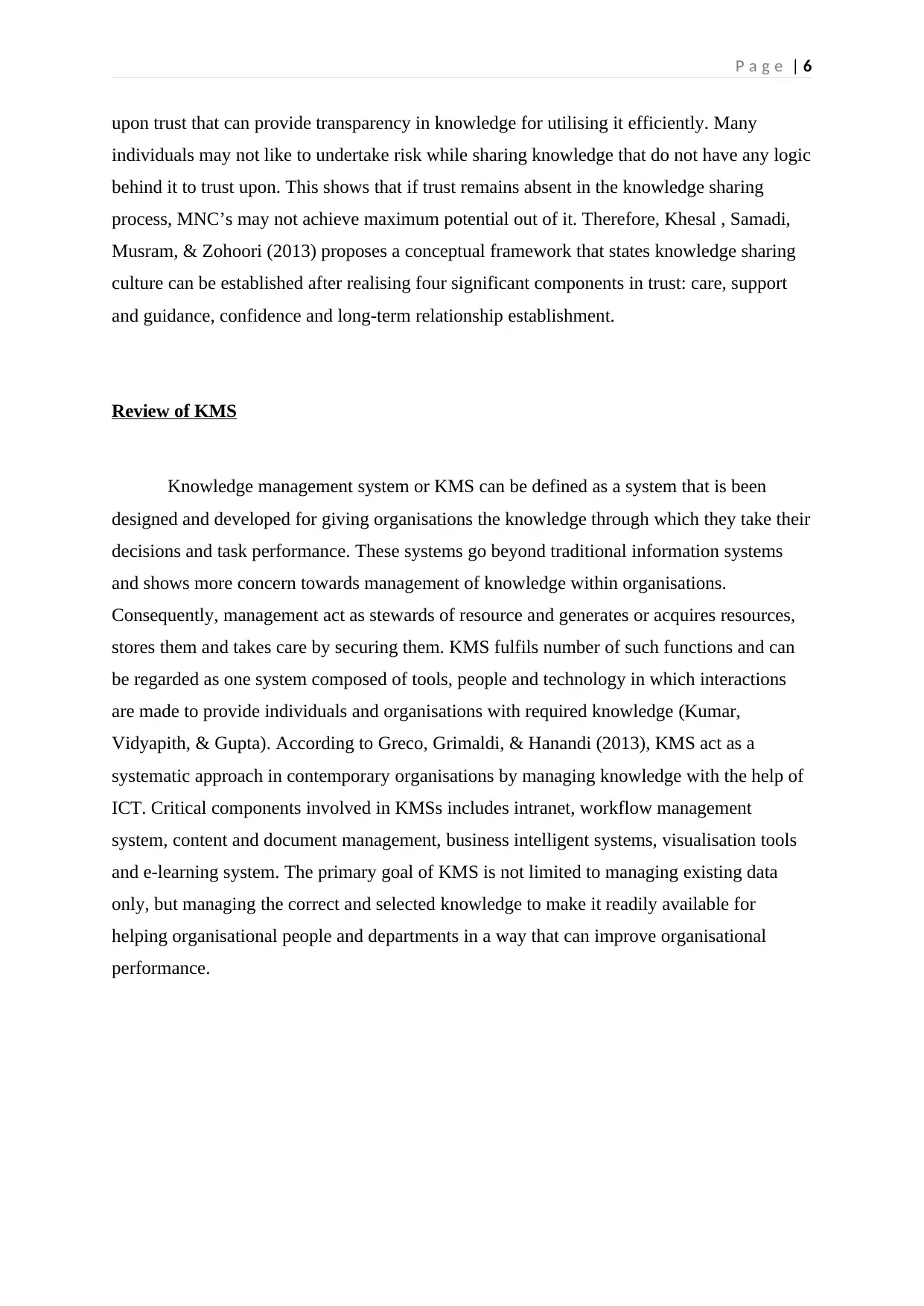
P a g e | 6
upon trust that can provide transparency in knowledge for utilising it efficiently. Many
individuals may not like to undertake risk while sharing knowledge that do not have any logic
behind it to trust upon. This shows that if trust remains absent in the knowledge sharing
process, MNC’s may not achieve maximum potential out of it. Therefore, Khesal , Samadi,
Musram, & Zohoori (2013) proposes a conceptual framework that states knowledge sharing
culture can be established after realising four significant components in trust: care, support
and guidance, confidence and long-term relationship establishment.
Review of KMS
Knowledge management system or KMS can be defined as a system that is been
designed and developed for giving organisations the knowledge through which they take their
decisions and task performance. These systems go beyond traditional information systems
and shows more concern towards management of knowledge within organisations.
Consequently, management act as stewards of resource and generates or acquires resources,
stores them and takes care by securing them. KMS fulfils number of such functions and can
be regarded as one system composed of tools, people and technology in which interactions
are made to provide individuals and organisations with required knowledge (Kumar,
Vidyapith, & Gupta). According to Greco, Grimaldi, & Hanandi (2013), KMS act as a
systematic approach in contemporary organisations by managing knowledge with the help of
ICT. Critical components involved in KMSs includes intranet, workflow management
system, content and document management, business intelligent systems, visualisation tools
and e-learning system. The primary goal of KMS is not limited to managing existing data
only, but managing the correct and selected knowledge to make it readily available for
helping organisational people and departments in a way that can improve organisational
performance.
upon trust that can provide transparency in knowledge for utilising it efficiently. Many
individuals may not like to undertake risk while sharing knowledge that do not have any logic
behind it to trust upon. This shows that if trust remains absent in the knowledge sharing
process, MNC’s may not achieve maximum potential out of it. Therefore, Khesal , Samadi,
Musram, & Zohoori (2013) proposes a conceptual framework that states knowledge sharing
culture can be established after realising four significant components in trust: care, support
and guidance, confidence and long-term relationship establishment.
Review of KMS
Knowledge management system or KMS can be defined as a system that is been
designed and developed for giving organisations the knowledge through which they take their
decisions and task performance. These systems go beyond traditional information systems
and shows more concern towards management of knowledge within organisations.
Consequently, management act as stewards of resource and generates or acquires resources,
stores them and takes care by securing them. KMS fulfils number of such functions and can
be regarded as one system composed of tools, people and technology in which interactions
are made to provide individuals and organisations with required knowledge (Kumar,
Vidyapith, & Gupta). According to Greco, Grimaldi, & Hanandi (2013), KMS act as a
systematic approach in contemporary organisations by managing knowledge with the help of
ICT. Critical components involved in KMSs includes intranet, workflow management
system, content and document management, business intelligent systems, visualisation tools
and e-learning system. The primary goal of KMS is not limited to managing existing data
only, but managing the correct and selected knowledge to make it readily available for
helping organisational people and departments in a way that can improve organisational
performance.
Paraphrase This Document
Need a fresh take? Get an instant paraphrase of this document with our AI Paraphraser
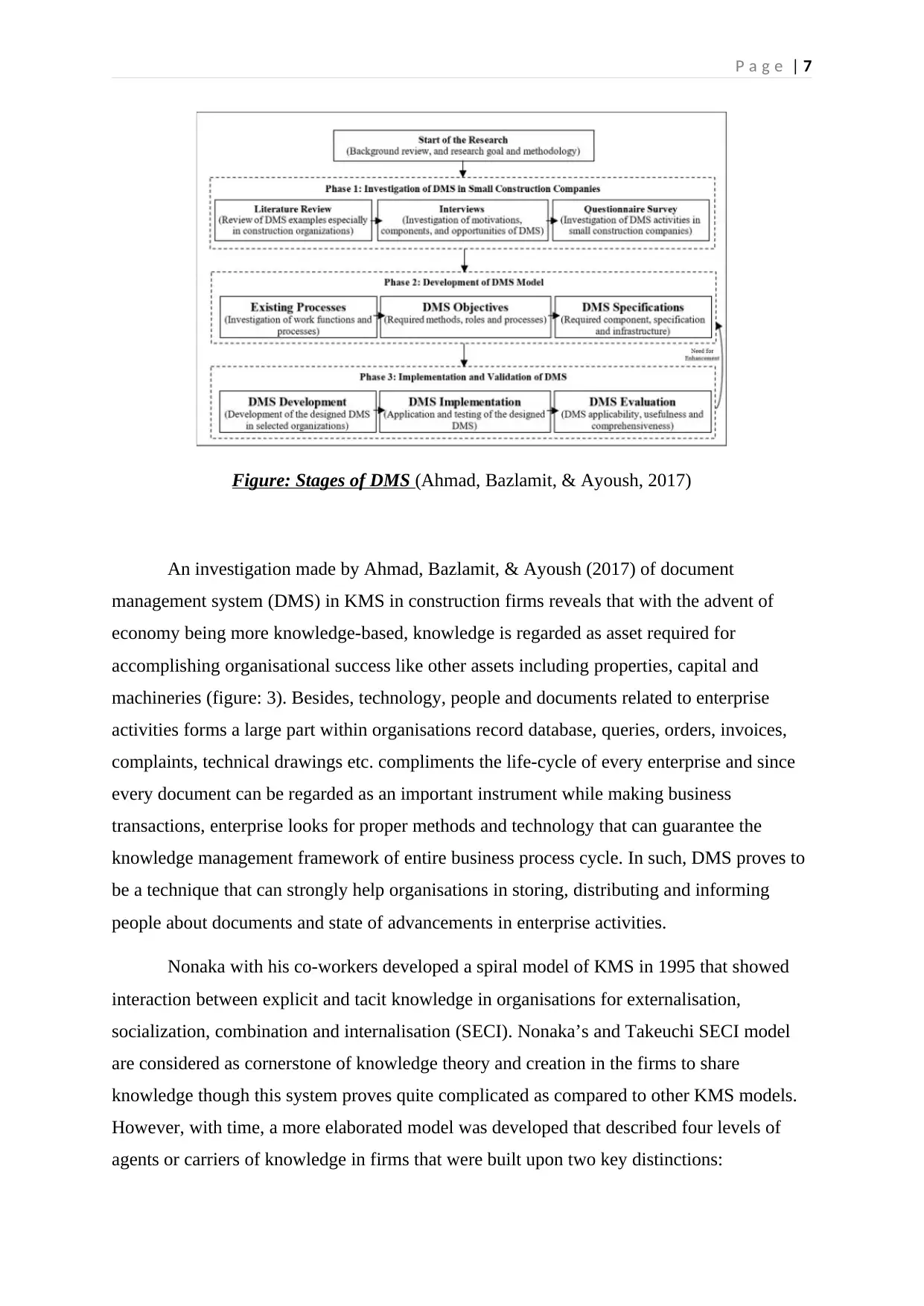
P a g e | 7
Figure: Stages of DMS (Ahmad, Bazlamit, & Ayoush, 2017)
An investigation made by Ahmad, Bazlamit, & Ayoush (2017) of document
management system (DMS) in KMS in construction firms reveals that with the advent of
economy being more knowledge-based, knowledge is regarded as asset required for
accomplishing organisational success like other assets including properties, capital and
machineries (figure: 3). Besides, technology, people and documents related to enterprise
activities forms a large part within organisations record database, queries, orders, invoices,
complaints, technical drawings etc. compliments the life-cycle of every enterprise and since
every document can be regarded as an important instrument while making business
transactions, enterprise looks for proper methods and technology that can guarantee the
knowledge management framework of entire business process cycle. In such, DMS proves to
be a technique that can strongly help organisations in storing, distributing and informing
people about documents and state of advancements in enterprise activities.
Nonaka with his co-workers developed a spiral model of KMS in 1995 that showed
interaction between explicit and tacit knowledge in organisations for externalisation,
socialization, combination and internalisation (SECI). Nonaka’s and Takeuchi SECI model
are considered as cornerstone of knowledge theory and creation in the firms to share
knowledge though this system proves quite complicated as compared to other KMS models.
However, with time, a more elaborated model was developed that described four levels of
agents or carriers of knowledge in firms that were built upon two key distinctions:
Figure: Stages of DMS (Ahmad, Bazlamit, & Ayoush, 2017)
An investigation made by Ahmad, Bazlamit, & Ayoush (2017) of document
management system (DMS) in KMS in construction firms reveals that with the advent of
economy being more knowledge-based, knowledge is regarded as asset required for
accomplishing organisational success like other assets including properties, capital and
machineries (figure: 3). Besides, technology, people and documents related to enterprise
activities forms a large part within organisations record database, queries, orders, invoices,
complaints, technical drawings etc. compliments the life-cycle of every enterprise and since
every document can be regarded as an important instrument while making business
transactions, enterprise looks for proper methods and technology that can guarantee the
knowledge management framework of entire business process cycle. In such, DMS proves to
be a technique that can strongly help organisations in storing, distributing and informing
people about documents and state of advancements in enterprise activities.
Nonaka with his co-workers developed a spiral model of KMS in 1995 that showed
interaction between explicit and tacit knowledge in organisations for externalisation,
socialization, combination and internalisation (SECI). Nonaka’s and Takeuchi SECI model
are considered as cornerstone of knowledge theory and creation in the firms to share
knowledge though this system proves quite complicated as compared to other KMS models.
However, with time, a more elaborated model was developed that described four levels of
agents or carriers of knowledge in firms that were built upon two key distinctions:
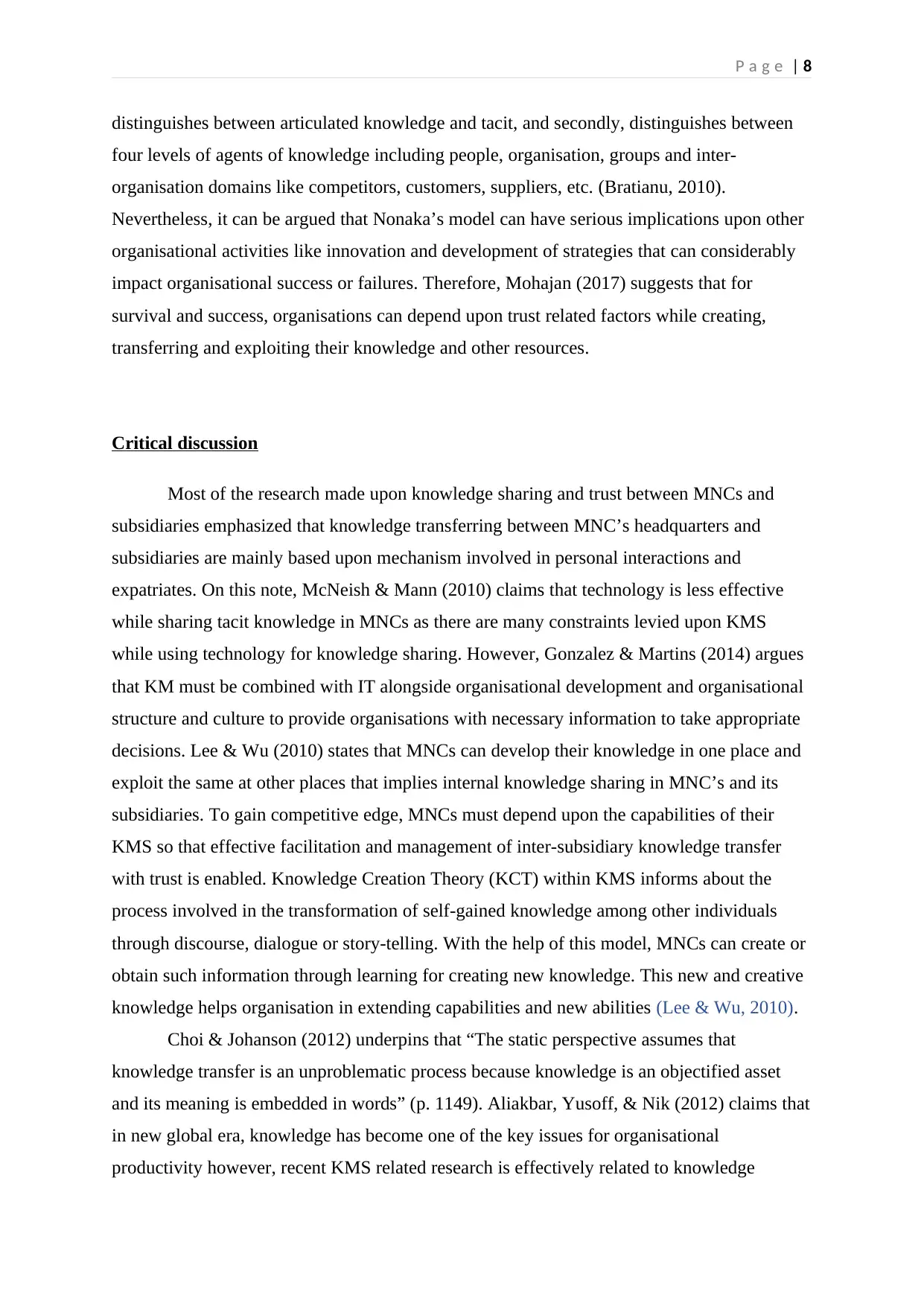
P a g e | 8
distinguishes between articulated knowledge and tacit, and secondly, distinguishes between
four levels of agents of knowledge including people, organisation, groups and inter-
organisation domains like competitors, customers, suppliers, etc. (Bratianu, 2010).
Nevertheless, it can be argued that Nonaka’s model can have serious implications upon other
organisational activities like innovation and development of strategies that can considerably
impact organisational success or failures. Therefore, Mohajan (2017) suggests that for
survival and success, organisations can depend upon trust related factors while creating,
transferring and exploiting their knowledge and other resources.
Critical discussion
Most of the research made upon knowledge sharing and trust between MNCs and
subsidiaries emphasized that knowledge transferring between MNC’s headquarters and
subsidiaries are mainly based upon mechanism involved in personal interactions and
expatriates. On this note, McNeish & Mann (2010) claims that technology is less effective
while sharing tacit knowledge in MNCs as there are many constraints levied upon KMS
while using technology for knowledge sharing. However, Gonzalez & Martins (2014) argues
that KM must be combined with IT alongside organisational development and organisational
structure and culture to provide organisations with necessary information to take appropriate
decisions. Lee & Wu (2010) states that MNCs can develop their knowledge in one place and
exploit the same at other places that implies internal knowledge sharing in MNC’s and its
subsidiaries. To gain competitive edge, MNCs must depend upon the capabilities of their
KMS so that effective facilitation and management of inter-subsidiary knowledge transfer
with trust is enabled. Knowledge Creation Theory (KCT) within KMS informs about the
process involved in the transformation of self-gained knowledge among other individuals
through discourse, dialogue or story-telling. With the help of this model, MNCs can create or
obtain such information through learning for creating new knowledge. This new and creative
knowledge helps organisation in extending capabilities and new abilities (Lee & Wu, 2010).
Choi & Johanson (2012) underpins that “The static perspective assumes that
knowledge transfer is an unproblematic process because knowledge is an objectified asset
and its meaning is embedded in words” (p. 1149). Aliakbar, Yusoff, & Nik (2012) claims that
in new global era, knowledge has become one of the key issues for organisational
productivity however, recent KMS related research is effectively related to knowledge
distinguishes between articulated knowledge and tacit, and secondly, distinguishes between
four levels of agents of knowledge including people, organisation, groups and inter-
organisation domains like competitors, customers, suppliers, etc. (Bratianu, 2010).
Nevertheless, it can be argued that Nonaka’s model can have serious implications upon other
organisational activities like innovation and development of strategies that can considerably
impact organisational success or failures. Therefore, Mohajan (2017) suggests that for
survival and success, organisations can depend upon trust related factors while creating,
transferring and exploiting their knowledge and other resources.
Critical discussion
Most of the research made upon knowledge sharing and trust between MNCs and
subsidiaries emphasized that knowledge transferring between MNC’s headquarters and
subsidiaries are mainly based upon mechanism involved in personal interactions and
expatriates. On this note, McNeish & Mann (2010) claims that technology is less effective
while sharing tacit knowledge in MNCs as there are many constraints levied upon KMS
while using technology for knowledge sharing. However, Gonzalez & Martins (2014) argues
that KM must be combined with IT alongside organisational development and organisational
structure and culture to provide organisations with necessary information to take appropriate
decisions. Lee & Wu (2010) states that MNCs can develop their knowledge in one place and
exploit the same at other places that implies internal knowledge sharing in MNC’s and its
subsidiaries. To gain competitive edge, MNCs must depend upon the capabilities of their
KMS so that effective facilitation and management of inter-subsidiary knowledge transfer
with trust is enabled. Knowledge Creation Theory (KCT) within KMS informs about the
process involved in the transformation of self-gained knowledge among other individuals
through discourse, dialogue or story-telling. With the help of this model, MNCs can create or
obtain such information through learning for creating new knowledge. This new and creative
knowledge helps organisation in extending capabilities and new abilities (Lee & Wu, 2010).
Choi & Johanson (2012) underpins that “The static perspective assumes that
knowledge transfer is an unproblematic process because knowledge is an objectified asset
and its meaning is embedded in words” (p. 1149). Aliakbar, Yusoff, & Nik (2012) claims that
in new global era, knowledge has become one of the key issues for organisational
productivity however, recent KMS related research is effectively related to knowledge
⊘ This is a preview!⊘
Do you want full access?
Subscribe today to unlock all pages.

Trusted by 1+ million students worldwide
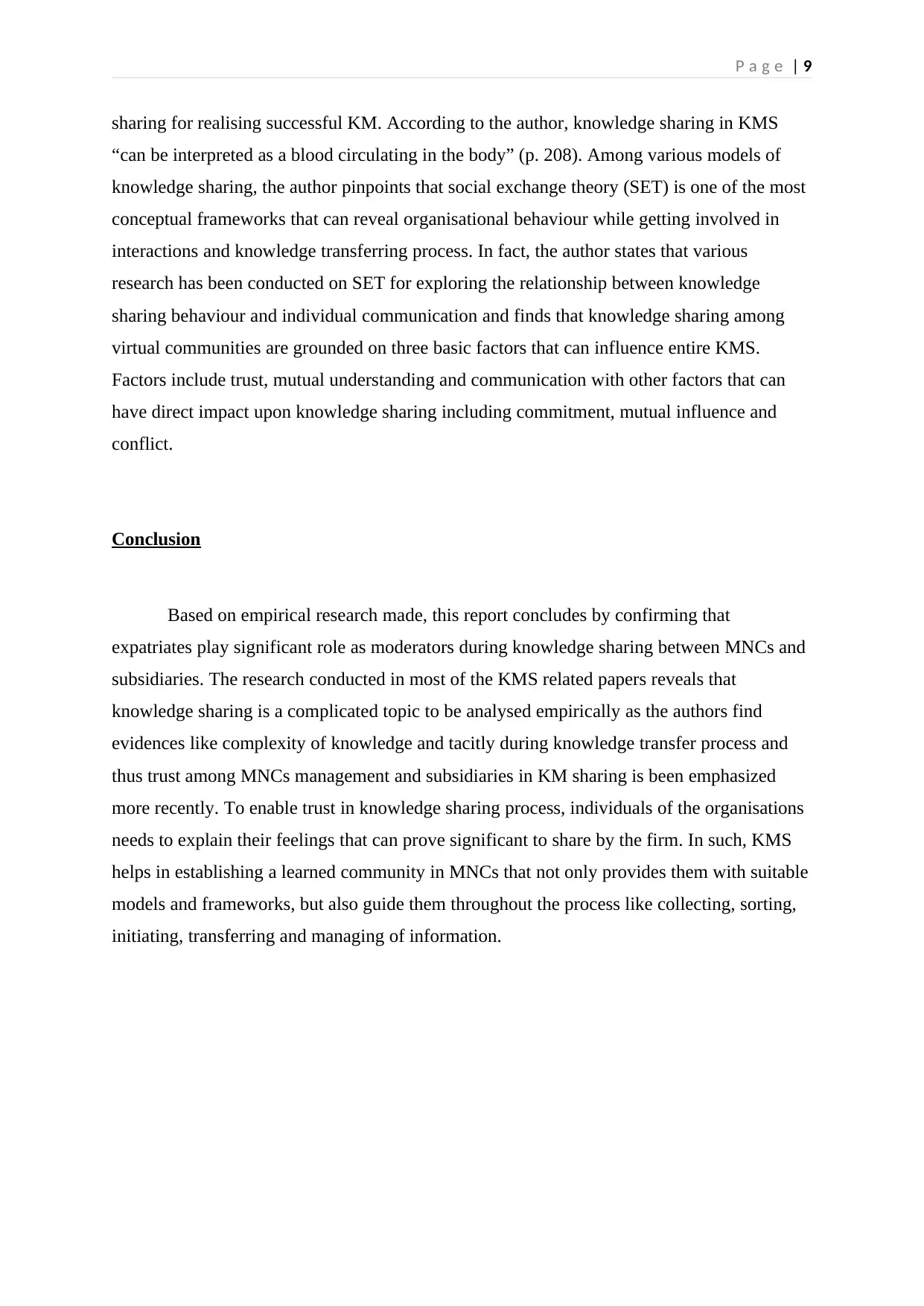
P a g e | 9
sharing for realising successful KM. According to the author, knowledge sharing in KMS
“can be interpreted as a blood circulating in the body” (p. 208). Among various models of
knowledge sharing, the author pinpoints that social exchange theory (SET) is one of the most
conceptual frameworks that can reveal organisational behaviour while getting involved in
interactions and knowledge transferring process. In fact, the author states that various
research has been conducted on SET for exploring the relationship between knowledge
sharing behaviour and individual communication and finds that knowledge sharing among
virtual communities are grounded on three basic factors that can influence entire KMS.
Factors include trust, mutual understanding and communication with other factors that can
have direct impact upon knowledge sharing including commitment, mutual influence and
conflict.
Conclusion
Based on empirical research made, this report concludes by confirming that
expatriates play significant role as moderators during knowledge sharing between MNCs and
subsidiaries. The research conducted in most of the KMS related papers reveals that
knowledge sharing is a complicated topic to be analysed empirically as the authors find
evidences like complexity of knowledge and tacitly during knowledge transfer process and
thus trust among MNCs management and subsidiaries in KM sharing is been emphasized
more recently. To enable trust in knowledge sharing process, individuals of the organisations
needs to explain their feelings that can prove significant to share by the firm. In such, KMS
helps in establishing a learned community in MNCs that not only provides them with suitable
models and frameworks, but also guide them throughout the process like collecting, sorting,
initiating, transferring and managing of information.
sharing for realising successful KM. According to the author, knowledge sharing in KMS
“can be interpreted as a blood circulating in the body” (p. 208). Among various models of
knowledge sharing, the author pinpoints that social exchange theory (SET) is one of the most
conceptual frameworks that can reveal organisational behaviour while getting involved in
interactions and knowledge transferring process. In fact, the author states that various
research has been conducted on SET for exploring the relationship between knowledge
sharing behaviour and individual communication and finds that knowledge sharing among
virtual communities are grounded on three basic factors that can influence entire KMS.
Factors include trust, mutual understanding and communication with other factors that can
have direct impact upon knowledge sharing including commitment, mutual influence and
conflict.
Conclusion
Based on empirical research made, this report concludes by confirming that
expatriates play significant role as moderators during knowledge sharing between MNCs and
subsidiaries. The research conducted in most of the KMS related papers reveals that
knowledge sharing is a complicated topic to be analysed empirically as the authors find
evidences like complexity of knowledge and tacitly during knowledge transfer process and
thus trust among MNCs management and subsidiaries in KM sharing is been emphasized
more recently. To enable trust in knowledge sharing process, individuals of the organisations
needs to explain their feelings that can prove significant to share by the firm. In such, KMS
helps in establishing a learned community in MNCs that not only provides them with suitable
models and frameworks, but also guide them throughout the process like collecting, sorting,
initiating, transferring and managing of information.
Paraphrase This Document
Need a fresh take? Get an instant paraphrase of this document with our AI Paraphraser
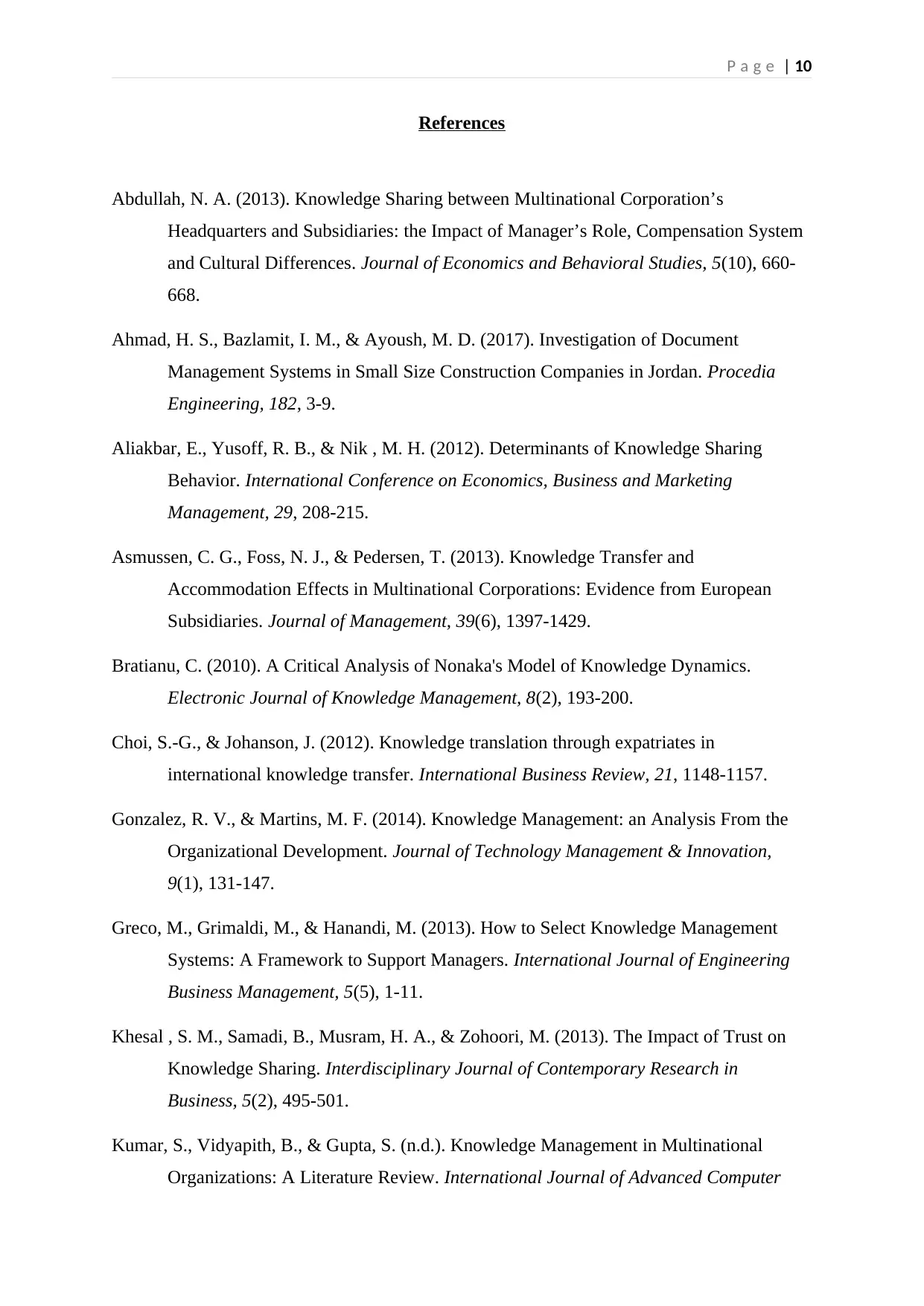
P a g e | 10
References
Abdullah, N. A. (2013). Knowledge Sharing between Multinational Corporation’s
Headquarters and Subsidiaries: the Impact of Manager’s Role, Compensation System
and Cultural Differences. Journal of Economics and Behavioral Studies, 5(10), 660-
668.
Ahmad, H. S., Bazlamit, I. M., & Ayoush, M. D. (2017). Investigation of Document
Management Systems in Small Size Construction Companies in Jordan. Procedia
Engineering, 182, 3-9.
Aliakbar, E., Yusoff, R. B., & Nik , M. H. (2012). Determinants of Knowledge Sharing
Behavior. International Conference on Economics, Business and Marketing
Management, 29, 208-215.
Asmussen, C. G., Foss, N. J., & Pedersen, T. (2013). Knowledge Transfer and
Accommodation Effects in Multinational Corporations: Evidence from European
Subsidiaries. Journal of Management, 39(6), 1397-1429.
Bratianu, C. (2010). A Critical Analysis of Nonaka's Model of Knowledge Dynamics.
Electronic Journal of Knowledge Management, 8(2), 193-200.
Choi, S.-G., & Johanson, J. (2012). Knowledge translation through expatriates in
international knowledge transfer. International Business Review, 21, 1148-1157.
Gonzalez, R. V., & Martins, M. F. (2014). Knowledge Management: an Analysis From the
Organizational Development. Journal of Technology Management & Innovation,
9(1), 131-147.
Greco, M., Grimaldi, M., & Hanandi, M. (2013). How to Select Knowledge Management
Systems: A Framework to Support Managers. International Journal of Engineering
Business Management, 5(5), 1-11.
Khesal , S. M., Samadi, B., Musram, H. A., & Zohoori, M. (2013). The Impact of Trust on
Knowledge Sharing. Interdisciplinary Journal of Contemporary Research in
Business, 5(2), 495-501.
Kumar, S., Vidyapith, B., & Gupta, S. (n.d.). Knowledge Management in Multinational
Organizations: A Literature Review. International Journal of Advanced Computer
References
Abdullah, N. A. (2013). Knowledge Sharing between Multinational Corporation’s
Headquarters and Subsidiaries: the Impact of Manager’s Role, Compensation System
and Cultural Differences. Journal of Economics and Behavioral Studies, 5(10), 660-
668.
Ahmad, H. S., Bazlamit, I. M., & Ayoush, M. D. (2017). Investigation of Document
Management Systems in Small Size Construction Companies in Jordan. Procedia
Engineering, 182, 3-9.
Aliakbar, E., Yusoff, R. B., & Nik , M. H. (2012). Determinants of Knowledge Sharing
Behavior. International Conference on Economics, Business and Marketing
Management, 29, 208-215.
Asmussen, C. G., Foss, N. J., & Pedersen, T. (2013). Knowledge Transfer and
Accommodation Effects in Multinational Corporations: Evidence from European
Subsidiaries. Journal of Management, 39(6), 1397-1429.
Bratianu, C. (2010). A Critical Analysis of Nonaka's Model of Knowledge Dynamics.
Electronic Journal of Knowledge Management, 8(2), 193-200.
Choi, S.-G., & Johanson, J. (2012). Knowledge translation through expatriates in
international knowledge transfer. International Business Review, 21, 1148-1157.
Gonzalez, R. V., & Martins, M. F. (2014). Knowledge Management: an Analysis From the
Organizational Development. Journal of Technology Management & Innovation,
9(1), 131-147.
Greco, M., Grimaldi, M., & Hanandi, M. (2013). How to Select Knowledge Management
Systems: A Framework to Support Managers. International Journal of Engineering
Business Management, 5(5), 1-11.
Khesal , S. M., Samadi, B., Musram, H. A., & Zohoori, M. (2013). The Impact of Trust on
Knowledge Sharing. Interdisciplinary Journal of Contemporary Research in
Business, 5(2), 495-501.
Kumar, S., Vidyapith, B., & Gupta, S. (n.d.). Knowledge Management in Multinational
Organizations: A Literature Review. International Journal of Advanced Computer
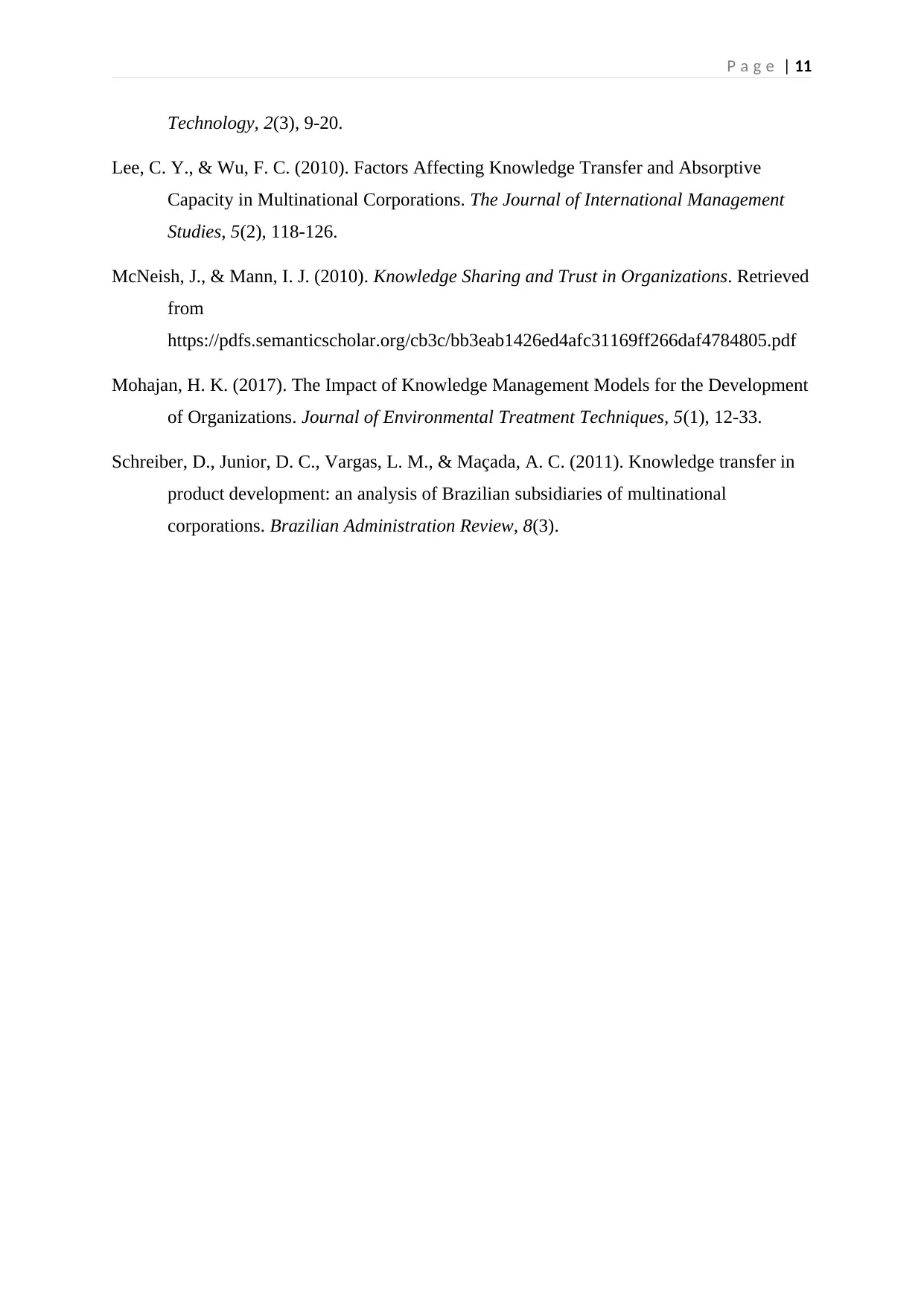
P a g e | 11
Technology, 2(3), 9-20.
Lee, C. Y., & Wu, F. C. (2010). Factors Affecting Knowledge Transfer and Absorptive
Capacity in Multinational Corporations. The Journal of International Management
Studies, 5(2), 118-126.
McNeish, J., & Mann, I. J. (2010). Knowledge Sharing and Trust in Organizations. Retrieved
from
https://pdfs.semanticscholar.org/cb3c/bb3eab1426ed4afc31169ff266daf4784805.pdf
Mohajan, H. K. (2017). The Impact of Knowledge Management Models for the Development
of Organizations. Journal of Environmental Treatment Techniques, 5(1), 12-33.
Schreiber, D., Junior, D. C., Vargas, L. M., & Maçada, A. C. (2011). Knowledge transfer in
product development: an analysis of Brazilian subsidiaries of multinational
corporations. Brazilian Administration Review, 8(3).
Technology, 2(3), 9-20.
Lee, C. Y., & Wu, F. C. (2010). Factors Affecting Knowledge Transfer and Absorptive
Capacity in Multinational Corporations. The Journal of International Management
Studies, 5(2), 118-126.
McNeish, J., & Mann, I. J. (2010). Knowledge Sharing and Trust in Organizations. Retrieved
from
https://pdfs.semanticscholar.org/cb3c/bb3eab1426ed4afc31169ff266daf4784805.pdf
Mohajan, H. K. (2017). The Impact of Knowledge Management Models for the Development
of Organizations. Journal of Environmental Treatment Techniques, 5(1), 12-33.
Schreiber, D., Junior, D. C., Vargas, L. M., & Maçada, A. C. (2011). Knowledge transfer in
product development: an analysis of Brazilian subsidiaries of multinational
corporations. Brazilian Administration Review, 8(3).
⊘ This is a preview!⊘
Do you want full access?
Subscribe today to unlock all pages.

Trusted by 1+ million students worldwide
1 out of 12
Related Documents
Your All-in-One AI-Powered Toolkit for Academic Success.
+13062052269
info@desklib.com
Available 24*7 on WhatsApp / Email
![[object Object]](/_next/static/media/star-bottom.7253800d.svg)
Unlock your academic potential
Copyright © 2020–2025 A2Z Services. All Rights Reserved. Developed and managed by ZUCOL.





